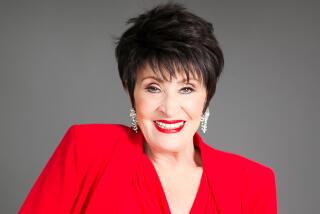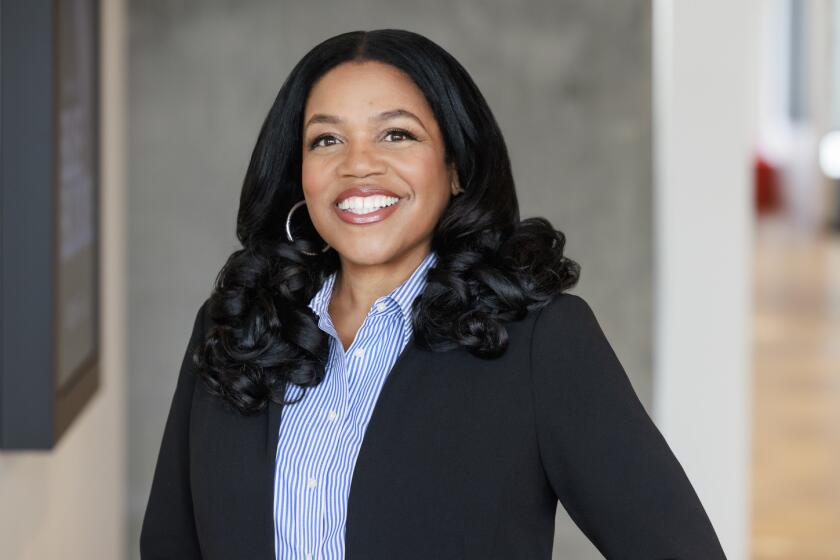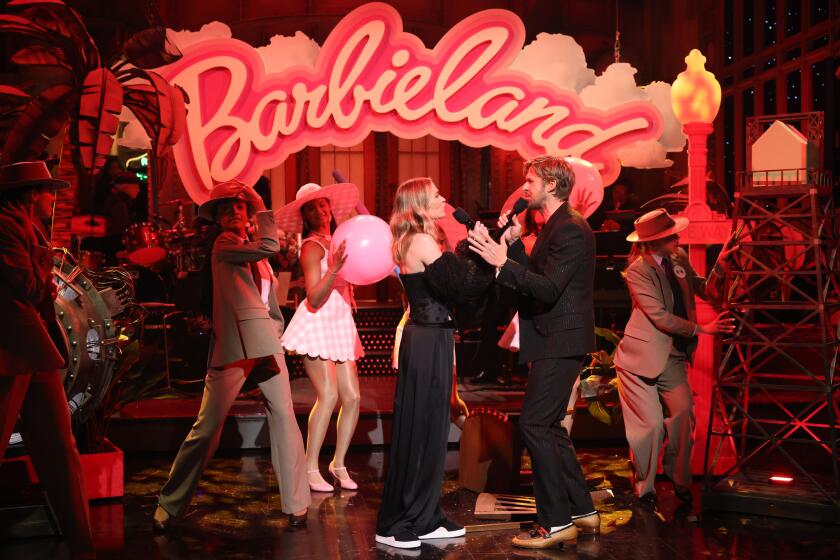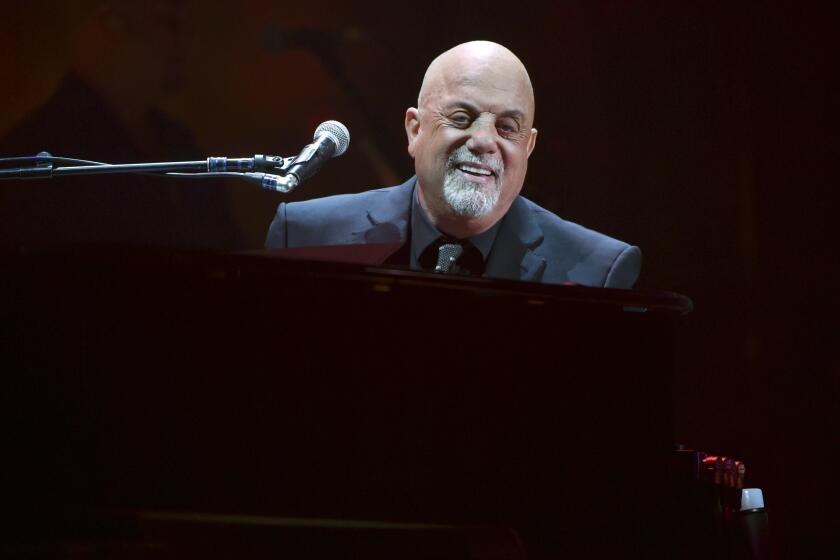Review: In ‘Marilyn Forever,’ Monroe yearns to be merely herself
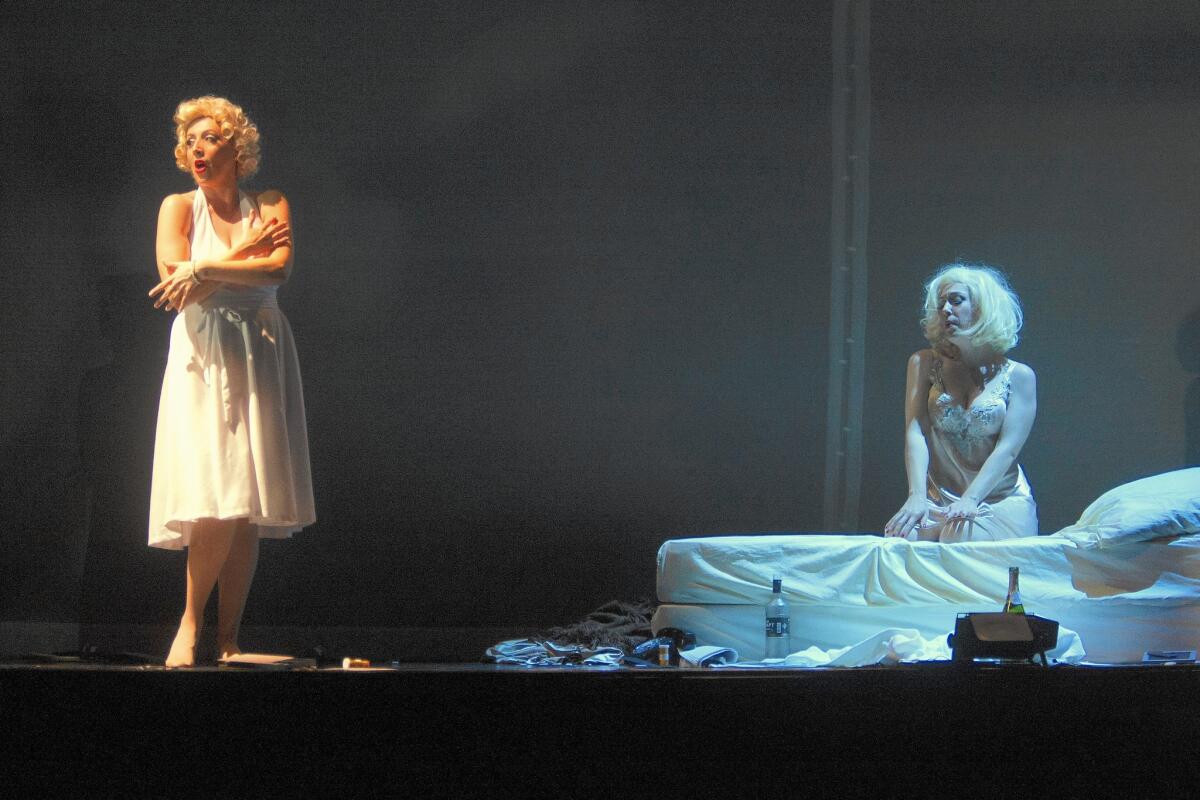
Marilyn Monroe was a figure of fascination whose allure went far beyond any fascination with her figure. Hers was the appeal of a divine beauty of outer form and inner substance, yet she proved too vulnerable to endure.
Did men use her and destroy her? Did the avidity of pop culture do the job? Were signs of a prescription drug overdose found near her unclad body in her Brentwood home in 1962 reasons to believe a self-destructive 36-year-old had committed suicide, or was there something more sinister? These are questions for opera, the art form that when responsibly practiced can go where biography doesn’t dare.
Gavin Bryars’ “Marilyn Forever,” given its first U.S. performance by Long Beach Opera on Saturday night at the Warner Grand Theatre in San Pedro, is the fourth major Marilyn opera since 1980. Theatrically, it covers grim old ground.
But Bryars’ music offers an ineffable atmosphere and mood so rich that this becomes the first operatic score to give Marilyn the room she always wanted in life, simply to be Marilyn. She never got it, and that, this claustrophobic opera implies, may have been what crushed her.
“Forever Marilyn” begins where Robin de Raaff’s earlier “Waiting for Miss Monroe” also begins: waiting for Monroe to arrive on the film set. This is near the end of her life. She’s falling apart and can hardly get out of bed.
De Raaff’s angst-ridden Expressionist score represented Marilyn as a victim in search of her soul. At one point she was gang-raped by former husband Joe DiMaggio in his Yankees uniform, John Kennedy, Robert Kennedy and Clark Gable (costar of her last film, “The Misfits”) dressed as Rhett Butler. The opera was commissioned for the 2012 Holland Festival in no-holds-barred Amsterdam.
Bryars’ “Forever Marilyn” premiered a year later in Victoria, Canada. It covers much the same territory, concentrating on Marilyn’s last days and her inner life, if without the sex and violence (but with a sincere regard for her soul). This is Canadian opera, with composer Bryars and librettist Marilyn Bowering living in British Columbia.
Bryars conceived “Forever Marilyn” as basically a one-woman chamber opera for a soprano Marilyn. It begins during the actress’ final moments as her life flashes by in short scenes. A single baritone (Lee Gregory) takes on all the male roles, from the initial rehearsal director to former husbands and other men who left their mark on Marilyn. A two-man chorus of tenor (Robert Norman) and bass (Adrian Rosales) adds further commentary and background pop vocals.
Bowering writes as a poet, and the voice of the poet enters into the voice of the star. “You change skins. You wriggle in to Marilyn,” Marilyn sings early on in the opera. “It’s the real you inside looking out.”
This became the source of Andreas Mitisek’s production. Long Beach Opera’s artistic and general director divided the part between two Marilyns, the outer and the inner. Throughout the opera, one soprano, Danielle Marcelle Bond, remains drugged and disheveled in her negligee. As the outer Marilyn, Jamie Chamberlin is the public figure on the set, crooning popular songs, coping with marriage and divorce. She sings happy birthday to President Kennedy. In the epilogue, both Marilyns come together to watch the mortician undress the body.
Live video projected large did help make each Marilyn more present, but the video also amplified the contrast between standard-issue upbeat and downbeat doppelgäangers. Watching the 80-minute performance, I kept thinking that the operatic Marilyn was given exactly the kind of typecasting that the real Monroe was trying to escape.
But Bryars’ score is her exit route. He favors low instruments, with a pit band of two violas, cello, bass, bass clarinet, bassoon, horn and resonant percussion. On stage is a jazz trio of saxophone, piano and bass (a bass player himself, Bryars played in the trio the first night, though he will not appear for the repeat on Sunday).
Here is a soundscape not of light and dark but a murkier world in between, implying complexity without necessarily sounding complex. That, then, implies a soul forgotten in the other Marilyn operas, including an intriguingly farcical 1980 Italian opera by Lorenzo Ferrero and an earnestly dull “Marilyn” by Ezra Laderman that New York City Opera commissioned in 1993.
Bryars’ eloquent score has an overriding melancholic quality with an effortless flow between onstage jazz and the more symphonic style of the pit band. Vocal lines are all flowing melody, mostly unresolved. Period-style pop songs in the style that Marilyn might have sung emerge in and out of the general musical material, as though moods of Marilyn, although Bowering’s pop lyrics miss the Tin Pan Alley zing by a mile.
The maudlin Marilyn here dims the light of the bright Marilyn. The true Marilyn was both, and her allure wasn’t, as it feels with this text and this staging, mimickry. With the help of Bryars’ bluesy wonder, very good singing throughout and Bill Linwood’s expert conducting, Marilyn struggles to come alive. Just as she did so sadly, yet so wondrously, in real life.
More to Read
The biggest entertainment stories
Get our big stories about Hollywood, film, television, music, arts, culture and more right in your inbox as soon as they publish.
You may occasionally receive promotional content from the Los Angeles Times.


